Curated OER
Metaphors
In this metaphor worksheet, students make a "word card" with the word metaphor for their vocabulary bank, then determine whether statement from The Dragonslayer are similes or metaphors,
Curated OER
Solid Waste
Students examine how to use their vocabulary, writing skills, and creative thinking to address environmental concerns in this unit. They write messages to using creative writing to address the issues of solid waste and recycling.
Curated OER
Come Fly With Me...Aviation
Students conduct internet research on aviation and pioneer aviators. They create an alphabet book r with flight related terms, write a short biography of a pioneer aviator and take part in a paper plane flying contest.
Curated OER
How To Identify Figurative Language
Students investigate writing techniques by analyzing a chart. In this figurative language lesson, students define similes, metaphors and identify the difference between them and personification. Students demonstrate their understanding...
Curated OER
Alphabet Books
Students work with a partner from a different grade level to brainstorm, draft, edit, illustrate and publish alphabet-themed books. They take turns reading the books to each other and conference with a teacher to review their work.
ReadWriteThink
Read Write Think: Alliteration All Around
This lesson introduces students to the concept of alliteration through the works of the author Pamela Duncan Edwards. Students interpret her illustrations and then create their own alliteration, sharing with the class.
ReadWriteThink
Read Write Think: Alliteration in Headline Poems
In this lesson plan, students will learn or review the topic of "alliteration" in writing. Then each student will create a 25-word headline poem that contains at least three examples of alliteration. [Requires Adobe Reader.]
ReadWriteThink
Read Write Think: All About Alliteration: Responding to Literature Through Poetry
For this lesson, students will listen to a book, A My Name Is by Alice Lyne, and they will learn about alliteration and alliterative words. After reading the book, students will use print and online resources to brainstorm their own...
Lumen Learning
Lumen: Reading and Interpreting Literary Texts: Approaching Poetry
This lesson focuses on the how to approach the analysis of poetry. It provides a series of student activities such as having students read and compare a draft and the final version of William Blake's "Tyger" which is followed by a...
Writing Fix
Writing Fix: Noodle Alliteration
This lesson allows students an opportunity to explore the dictionary and thesaurus to write creative alliterations about pasta after reading Jack Prelutsky's poem, "Spaghetti, Spaghetti."
Yale University
Yale New Haven Teachers Institute: Poetry for the Elementary Classroom
Site contains a narrative and three lesson plans. These plans are designed to assist students with various aspects of poetry. This site discusses strategies which enable students to effectively, memorize, recite, and correctly pronounce...
Alabama Learning Exchange
Alex: Producing Poetic Podcasts (Hey, That's Alliteration!)
In this culminating lesson for a poetry unit, learners will create a video podcast that summarizes a specific poem, analyzes the poet's use of literary elements, and infers the meaning of the poem (theme). The podcast must use a talk...
National Endowment for the Humanities
Neh: Edsit Ement: A Prelude to Beowulf
Before reading the Anglo-Saxon epic poem, "Beowulf," students should explore the Dark Ages through researching the fundamental characteristics of the art and literature produced during this period. This website provides links for doing...
National Endowment for the Humanities
Neh: Edsit Ement: Analyzing Poetic Devices: Robert Hayden and Theodore Roethke
Learners examine the relationship of poetic form and content, shaped by alliteration, consonance, repetition, and rhythm, in two poems about fatherhood: Robert Hayden's "Those Winter Sundays" and Theodore Roethke's "My Papa's Waltz."
British Library
British Library: Robert Browning: Creative Writing
Looking at three of Robert Browning's poems, students will be encouraged to think critically and create compositions that explore complex themes.[PDF]
ReadWriteThink
Read Write Think: Strategy to Define: Identify Poetic Terms
Online lesson plan offers teachers the ability to teach a "Four-square," strategy technique for poetic terms. Middle schoolers explore websites and define terms such as alliteration, assonance, simile, and rhyme.
National Endowment for the Humanities
Neh: Edsit Ement: There Once Was...
Part 2 of this tutorial on limerick writing demonstrates the importance of form (meter and rhyme) in limerick poetry using the exemplary and amusing work of Edward Lear.
Love To Know Media
Your Dictionary: Literary Terms Lesson Plan
This is a lesson plan for teaching the seven literary terms used in poetry: simile, metaphor, alliteration, imagery, hyperbole, personification, and onomatopoeia.
Scholastic
Scholastic: Chants and Street Rhymes [Pdf]
Four pages of with chants and street rhymes. Three of the pages are reproducible examples and information useful to young scholars, and one page gives lesson ideas for teachers.
Other popular searches
- Poetry Alliteration Examples
- Alliteration in Poetry
- Poetry Alliteration for Kids
- Poetry Alliteration Grade 3
- Alliteration Poetry
- Poetry Alliteration Grade 9
- Poetry Alliteration Grade 4
- Poetry Alliteration Grade 2
- Poetry Alliteration for Lion
- Free Poetry Alliteration
- Alliterations in Poetry
- Using Alliteration in Poetry





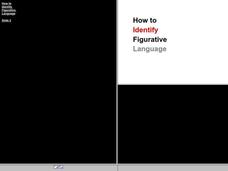
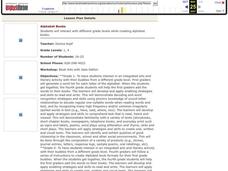



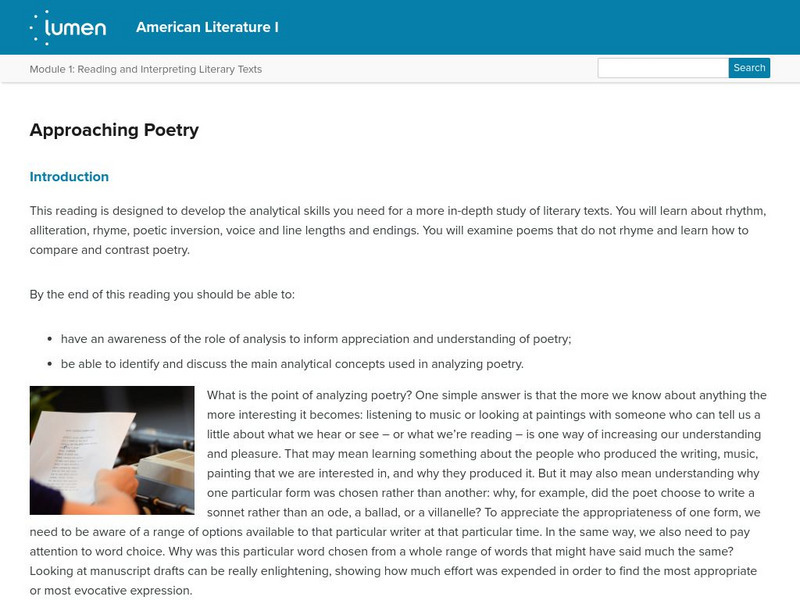



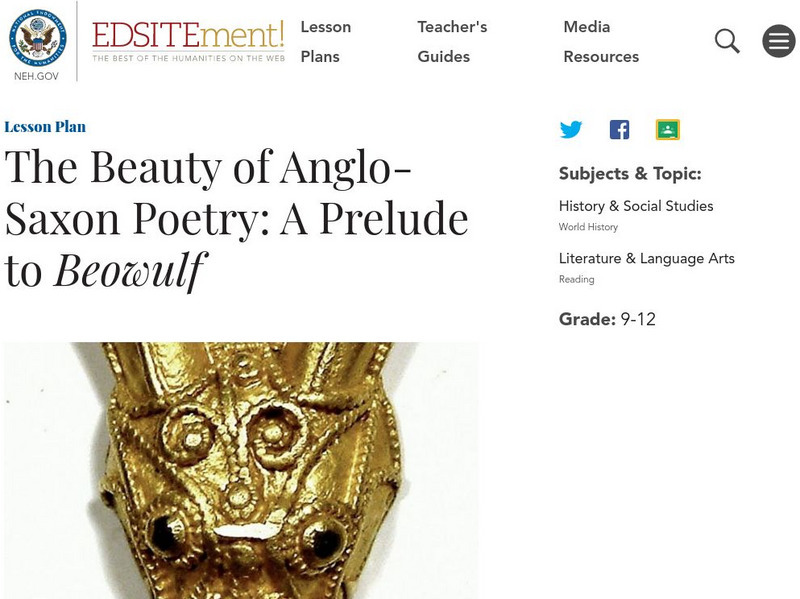

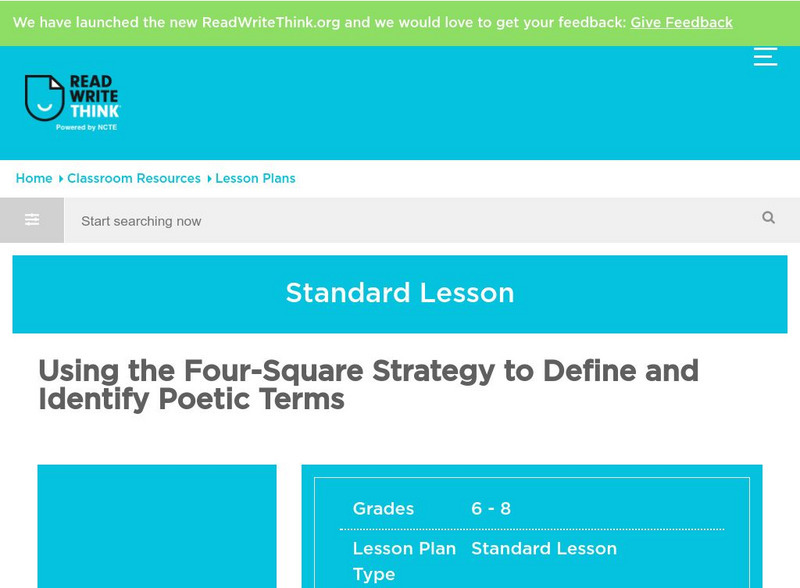
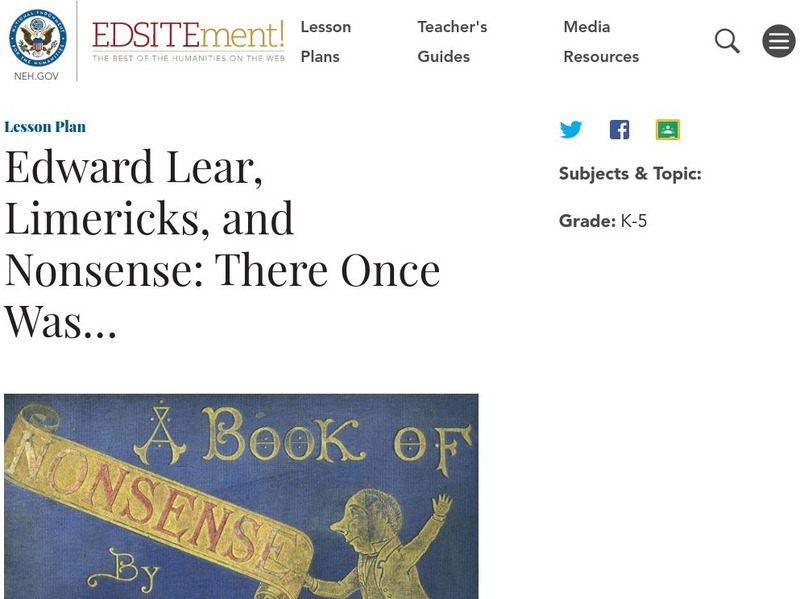

![Scholastic: Chants and Street Rhymes [Pdf] Lesson Plan Scholastic: Chants and Street Rhymes [Pdf] Lesson Plan](https://content.lessonplanet.com/knovation/original/235777-009e8269cd1a92699375576104471b3b.jpg?1661409426)